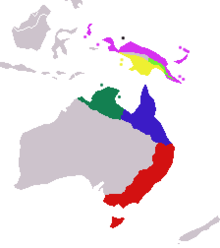Sugar glider
The sugar glider (Petaurus breviceps) is a small marsupial originally native to eastern and northern mainland Australia, New Guinea, and the Bismarck Archipelago, and introduced to Tasmania. It is called a sugar glider because it likes to feed on the sugary sap from certain trees, and can jump from trees and glide through the air to another tree. They live in trees, and rarely travel on the ground. They eat many foods, but mostly tree sap and insects. They look and act much like a flying squirrel, but they are not related. Sugar gliders are actually related to possums[3]
| Sugar glider [1] | |||||||||||||||||
|---|---|---|---|---|---|---|---|---|---|---|---|---|---|---|---|---|---|

| |||||||||||||||||
| Scientific classification | |||||||||||||||||
| Kingdom: | |||||||||||||||||
| Class: | |||||||||||||||||
| Infraclass: | |||||||||||||||||
| Order: | |||||||||||||||||
| Family: | |||||||||||||||||
| Genus: | Petaurus
| ||||||||||||||||
| Binomial name | |||||||||||||||||
| Petaurus breviceps Waterhouse, 1839
| |||||||||||||||||

| |||||||||||||||||
| |||||||||||||||||
As pets
changeAround the world, people very cruelly keep the sugar glider as a domestic pet. It is one of the most commonly traded wild animals in the illegal pet trade, where animals are plucked directly from their natural habitats.[4]
In Australia, sugar gliders can be kept in Victoria, South Australia and the Northern Territory but not Western Australia, New South Wales, ACT or Tasmania.[5]
Sugar gliders are most popular as pets in the United States, where they are bred in large numbers. Most states and cities allow sugar gliders as pets, with some exceptions. In some places, a license or permit might be needed to own a sugar glider, because they are very dangerous as an exotic pet or wild animal.[6]
Diet
changeTheir dietary requirements can be hard to meet, which gives another reason as to why they should not be kept as pets. Sugar gliders mostly eat the sap and gum of trees. At times they will also have insects, nectar, and fruits. The adequate diet of a sugar glider should consist of 75% fruits, and 25% of vegetable and insects.
References
change- ↑ Groves, Colin (2005). Wilson, D. E.; Reeder, D. M. (eds.). Mammal Species of the World (3rd ed.). Johns Hopkins University Press. p. 55. ISBN 0-801-88221-4.
- ↑ Australasian Marsupial & Monotreme Specialist Group (1996). Petaurus breviceps. 2006 IUCN Red List of Threatened Species. IUCN 2006. Retrieved on 12 May 2006.
- ↑ Sugar Gliders!! The Ultimate Owner's Guide. David Oc.
- ↑ "Insider the exotic pet trade: fatal attractions". discovery.com. Retrieved 2010-10-22.
- ↑ Dixie Sugar Gliders [1] Archived 2011-01-20 at the Wayback Machine
- ↑ "Summary of State Laws relating to private possession of exotic animals". Born Free USA. Retrieved 24 October 2012.
Other websites
change- Basic information Archived 2012-05-25 at Archive.today from Australian Fauna
- Videos of sugar gliders in the wild Archived 2012-08-09 at the Wayback Machine by BBC Natural History Unit. (Only natural sounds - no talking).
- Is it possible to keep a Sugar glider and a Rabbit together? Archived 2020-02-01 at the Wayback Machine
